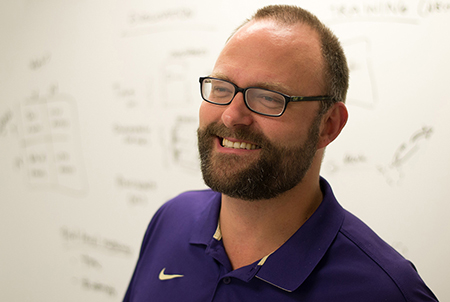
Information School Professor Jacob O. Wobbrock’s research into touch-screen accessibility is being honored for making a lasting impact over the past 11 years by addressing the needs of people with disabilities in the era of smartphones and tablets.
Wobbrock and fellow researchers Shaun Kane, iSchool Ph.D. ’11, and Jeffrey Bigham, Computer Science Ph.D. ’09, are being honored with this year’s SIGACCESS ASSETS Paper Impact Award, given biennially by the Association for Computing Machinery’s Special Interest Group on Accessible Computing. The award honors a paper published at least a decade earlier that made a significant innovation or has been influential in the field. Their winning 2008 paper was titled, “Slide Rule: Making mobile touch screens accessible to blind people using multi-touch techniques.”
The research that led to Slide Rule came amid the early popularity of Apple’s iPhone, which initially was a step backward for blind users who relied on a cell phone’s physical buttons and could not use many of the new iPhone’s features.
“With the advent of the iPhone, I asked how on earth a blind person could operate such a device, where all they would feel, aside from the one physical ‘Home’ button, is the flat glass of the screen,” Wobbrock said.
In response, he and his students designed a prototype by hacking an iPod Touch and demonstrating how its screen could be made accessible to blind people. They created the first finger-driven screen reader, a series of intuitive flick gestures for navigation, and an accurate method of tapping targets that allowed the user’s finger to stay on the screen without having to dwell in one place. All of these features have since appeared in major commercial products.
Apple introduced VoiceOver in 2009, allowing blind users to explore the touch screen and listen to what was there using text-to-speech technology. They could tether the phone to a Braille display and use gestures to perform tasks. While Slide Rule wasn’t officially credited, many in the research community have noted the similarities between it and VoiceOver. Among them is Richard Ladner, a professor emeritus in the Paul G. Allen School of Computer Science & Engineering, who made the connection in nominating Slide Rule for the award.
“Before the introduction of VoiceOver, this paper publicly demonstrated that touch-screen devices could be made to be accessible to blind users. Remarkably, the touch-screen gestures explored in the paper are among those that are used in VoiceOver,” Ladner wrote.
Kane, then a Ph.D. student advised by Wobbrock, was the first author on the paper. Now an associate professor at the University of Colorado, Boulder, he said Slide Rule overcame initial skepticism from blind users who thought the approach couldn’t work.
"Given the prevalence of touch screens in our society, the need to make them accessible to all people is still great."
“As human-computer interaction researchers, we're taught to always listen to the user,” Kane said, adding that by pushing ahead, he discovered something that influenced his future research. “What I learned is that while users can speak to their present and past experiences, sometimes the only way to learn whether some new form of technology will work is to build a prototype and try it out.”
All three of the paper’s authors have continued to work to make technology more accessible. Bigham works on accessibility as an associate professor at Carnegie Mellon University’s Human-Computer Interaction Institute; Kane directs the University of Colorado’s Superhuman Computing Lab; and Wobbrock, one of the world’s leading HCI researchers, directs the ACE Lab (for Accessible Computing Experiences) at the UW.
“There is still work to do relating to the accessibility of touch screens, tablets, and tactile graphics,” said Kane, who earned his Ph.D. at the iSchool in 2011. “Our group is still exploring these problems, especially as they relate to more complex representations like video and tactile graphics.”
Wobbrock and Kane — along with Martez Mott, iSchool Ph.D. ’18, and Romanian researcher Radu-Daniel Vatavu — recently collaborated on Smart Touch, which took a similar approach to Slide Rule. Whereas Slide Rule was for people who are blind, Smart Touch was about making touch screens accessible to people with motor impairments. Both projects try to capitalize on the abilities of their users and make the systems they are using amenable to those abilities, an approach Wobbrock calls Ability-Based Design.
“Slide Rule removed the need to see the screen. Smart Touch removed the need to touch precisely with a single finger,” Wobbrock said. “Given the prevalence of touch screens in our society, the need to make them accessible to all people is still great, and we will continue to pursue that goal, along with the many other projects we are doing.”
The SIGACCESS ASSETS Paper Impact Award, which carries a $500 prize and plaque for the winners, will be presented at the ASSETS 2019 conference in late October in Pittsburgh, Pennsylvania.